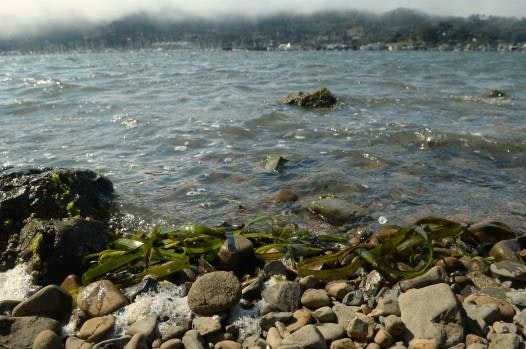Richardson Bay monitors cite signs of eelgrass recovery

Eelgrass washes up on the shore along Richardson Bay in Tiburon on Wednesday, Sept. 14, 2022. (Alan Dep/Marin Independent Journal) By GIUSEPPE RICAPITO | gricapito@marinij.com |
Richardson Bay Agency Awards Eelgrass Restoration Contract
PUBLISHED: September 27, 2023 at 5:45 p.m. | UPDATED: September 27, 2023 at 5:59 p.m. A Bay Area conservation consultancy has been hired to implement a $1.1 million grant to restore eelgrass in Richardson Bay.
The Richardson Bay Regional Agency board of directors voted unanimously on Sept. 14 to approve the deal, which authorized Executive Director Brad Gross to execute a contract with Coastal Policy Solutions in the amount of $1,129,000. The contract has a stipulation for a potential increase of $266,900 and is to not exceed $1,395,900.
The program calls for the restoration of 15 acres of eelgrass by 2027. The contract is a portion of a $2.8 million grant awarded to the agency by the Environmental Protection Agency in June. The grant calls for the development of an eelgrass management plan, research and restoration. The RBRA operates on a $1.84 million budget.
“This grant will allow us to move from just protecting eelgrass and stopping the damage to restoring some of what we’ve already lost,” said Rebecca Schwartz Lesberg, president of Coastal Policy Solutions.
As part of the contract, Coastal Policy Solutions will partner with Merkel and Associates, San Francisco State University and Audubon California on the restoration work.
Schwartz Lesberg said the work would move from a protection phase to a restoration phase. “We wanted to get us to a point where we are not destroying any more eelgrass, so now we can really start to be proactive in helping the bed recover from the damage that has happened,” she said.
As project manager, Coastal Policy Solutions will lead the effort to regrow eelgrass on locations with anchor scour, or where vessels have damaged the eelgrass beds.
“We are taking the steps now to protect our eelgrass environment while also acting with compassion and being deliberate about our decisions,” said RBRA Executive Director Brad Gross. “This is a collaborative, commonsense move to create a thriving Richardson Bay for everyone to enjoy.”
The contract is part of the ongoing restoration efforts in Richardson Bay as the agency slowly pushes to the removal of anchor-outs, or the boat dwelling residents of the bay.
The agency plans to remove all vessels from the eelgrass protection zone, a designated area for environmental conservation, by October 2024. Most vessels must adhere to the 72-hour enforcement rule by October 2026, except for some vessels, which will receive a one-year extension.
There remains about 50 vessels still anchored in the eelgrass protection zone, according to the RBRA, as various deadlines approach for the anchor-outs to vacate the eelgrass protection zone and other portions of the bay.
The agency enforces a 72-hour anchoring limit in the bay. In August 2021, the Richardson Bay agency approved a settlement with the San Francisco Bay Conservation and Development Commission that requires the removal of all illegally anchored vessels by Oct. 15, 2026.
The agency is offering a variety of services to prompt the removal of the remaining anchor-outs. In April, the agency reinstated a vessel buyback program targeting anchor-out boats. The agency has purchased 12 vessels.
Marin County supervisors also recently agreed to a $344,680 contract with Episcopal Community Services to provide a caseworker for outreach to people living on the vessels. The service will offer a one-year federal housing voucher supplied by the Marin Housing Authority, valued at about $116,000, to move off the water.
Peter Romanowsky, an anchor-out, called into the Sept. 14 meeting to urge mariners to take advantage of the agency’s housing relocation services. He said he would seek a permanent housing voucher over a temporary one, however, due to the changes required to his lifestyle in old age. “Imagine what people are going to need to relocate their way of life,” he said. “That’s all what people know out here.”
